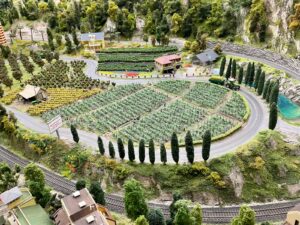Bristol’s vision of a new energy system
 At the end of January the Department of Energy & Climate Change (DECC) launched the long-awaited community energy strategy. Nearly two years in development, the process involved researching, consulting and revising drafts between various groups within DECC and beyond. Their aims, to help existing groups grow, inspire others to form, and tap into the enthusiasm and commitment of grassroots activity.
At the end of January the Department of Energy & Climate Change (DECC) launched the long-awaited community energy strategy. Nearly two years in development, the process involved researching, consulting and revising drafts between various groups within DECC and beyond. Their aims, to help existing groups grow, inspire others to form, and tap into the enthusiasm and commitment of grassroots activity.
Meanwhile, a flourishing network of community energy initiatives led to a Bristol community strategy for energy during 2013. The Bristol strategy was developed through the umbrella organisation Bristol Energy Network, by local community groups and the organisations they work with. It sets out aims for local action on sustainable energy and seeks to enable community initiatives to work in collaboration with local authorities, private and third sector organisations.
The two strategies have different origins and operate in different contexts, so how do they fare as strategies for a sustainable energy future?
On the face of it both strategies appear to share a common vision: Putting communities at the heart of energy policy/Bristol’s energy system (delete as appropriate). But from here they diverge significantly.
Where Bristol lays out its vision as ‘a city where everyone has access to sufficient, affordable low-carbon energy, with active communities across the city generating and managing a significant amount of their energy need’, DECC’s vision remains somewhat opaque. The executive summary lists generic benefits of increased community engagement: unlocking opportunities, engaging consumers, developing solutions to meet local needs and so on. The DECC strategy also states that ‘every community that wants to form an energy group or take forward a project should be able to do so’ and mentions potential for renewables targets. But it’s hardly radical. In fact, Jonathon Porritt claims a lack of vision at all, stating, ‘we have a strategy, we have a community energy unit in DECC, we have an emerging action plan, but we have no vision’.
From these vision statements come differences in the construction of each strategy. DECC’s strategy outlines the state of play now, specific issues faced by communities and community involvement in four main types of energy activity: generating, reducing, managing and purchasing energy. Bristol’s strategy outlines the foundations of a community approach and the case for community activism, organised under five distinct but interlinked themes: community resilience and fuel poverty, understanding energy and behaviour, energy efficiency and low carbon technology, renewable energy generation, and local economic development. The result – DECC’s strategy is called ‘unapologetically practical’ by Ed Davey, whilst Bristol’s is unapologetically aspirational.
DECC has gone to some length to take a diverse arena of activity and clearly distinguish it. This is no easy task, for community energy has developed with considerable diversity of projects, motivations and organisational forms. The end result is a national strategy that defines community energy as including projects that engage with reducing, managing, generating or purchasing energy, as including longer-term initiatives (but not initiatives run by local authorities, housing associations or ‘intermediary’ organisations), and joint ventures, between private developers and a variety of community organisations (both formal and informal).
This somewhat, incoherent definition (discussed in more detail in CSE’s recent article) contrasts strongly with the Bristol strategy, which was based on cross-sector consultation and simply sidesteps the perceived need to define activity. Instead the diversity and innovation of community approaches is reinforced: it opens up a space for experimentation and learning-by-doing.
The Bristol strategy recognises that community action forms only one piece of a new energy policy puzzle. It acknowledges that the new approach will require engagement with local authorities, businesses (large and small) and communities (of all types). Most importantly the Bristol strategy sees communities not as the vanguard of a sustainable energy future but important sources of diversity, empowerment and engagement with contemporary and future energy systems.
At 24 pages in length the Bristol strategy inevitably fails to capture the full complexity of the necessary changes involved, is very much a living document, and has limitations in terms of funding. But it also presents an approach to tackling change that is easy to get to grips with and (we hope) inspires future action. DECC on the other hand set out defined opportunities for next steps but, like its community definition, may limit approaches rather than provide opportunities to truly broaden out and scale-up activity.
For Bristol then, the strategy is about challenging contemporary thinking and presenting an aspirational vision of a new energy system. DECC’s pragmatic strategy includes some defined (and positive) steps but remains at odds with wider energy system structures, like an electricity market which favours market incumbents and large-scale generators.
Both strategies are a welcome first step. But given their differences it will be interesting to see how they play out next to each other.















